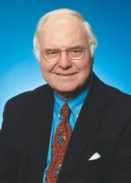
Michael Novak, a Catholic philosopher, theologian and author who was highly regarded for his religious scholarship and intellectual independence, died Feb. 17 at his home in Washington. He was 83.
Since last August, Novak had been a faculty member of The Catholic University of America’s Tim and Steph Busch School of Business and Economics in Washington. He joined the business school’s Arthur and Carlyse Ciocca Center for Principled Entrepreneurship last year as a distinguished visiting fellow.
He taught special topics in management and gave a series of lectures on campus on the topic of human ecology.
The author of more than 50 books, Novak shared his insights into the spiritual foundations of economic and political systems and the moral ideals of democratic capitalism in syndicated columns and innumerable lectures, articles and commentaries.
He considered his greatest honor to be that St. John Paul II called him a friend, as did Prime Minister Margaret Thatcher and President Ronald Reagan.
Novak, whose 1982 book “The Spirit of Democratic Capitalism” changed the public conversation about the benefits of capitalism, was awarded the Templeton Prize for Progress in Religion in 1994. He also served as ambassador to the U.N. Commission (now Commissioner) on Human Rights in 1981 and 1982.
In an interview with Catholic News Service after he won the Templeton Prize, he said he saw a failure in the checks and balances of government, with its major flaw being “the interests of politicians in offering goodies and their lack of interest in seeing that they’re paid for.’’
To counteract that, he said, the church needs to push its “well-developed theory of civil society’’ independent of the state – “the family, educational systems, labor unions, associations of many kinds.’’
